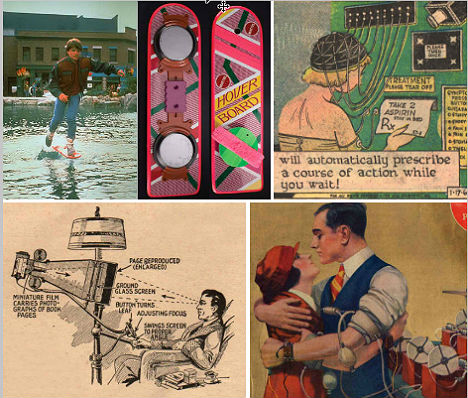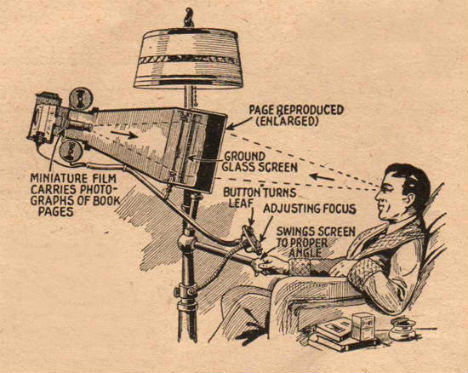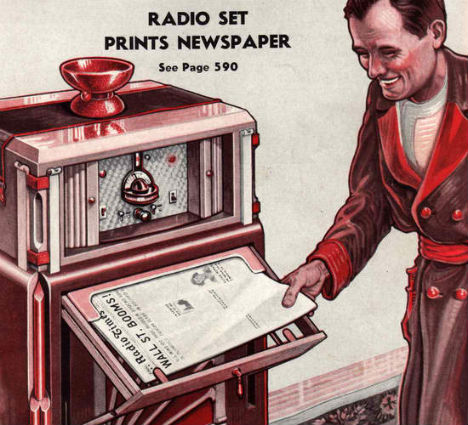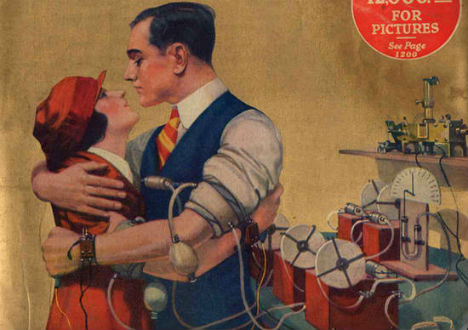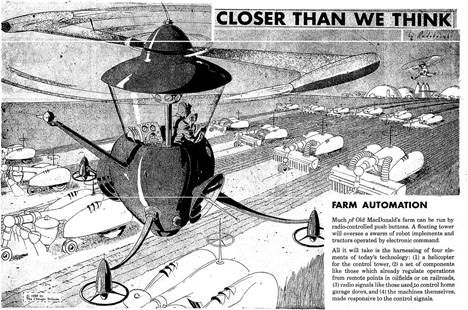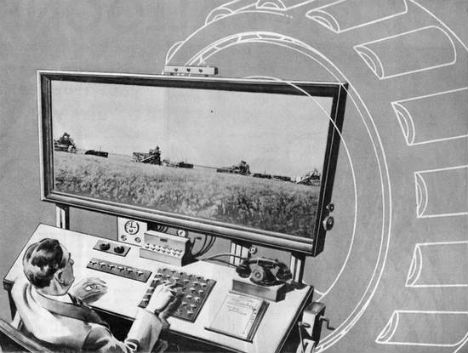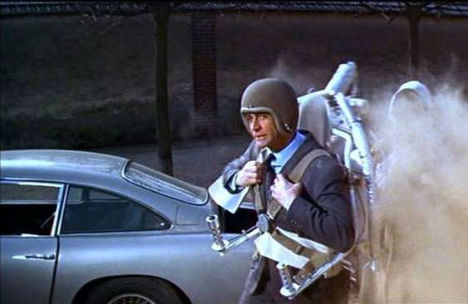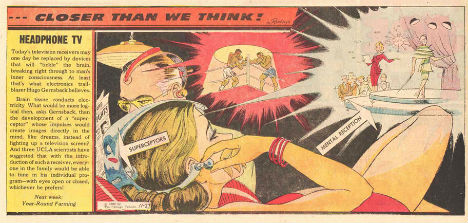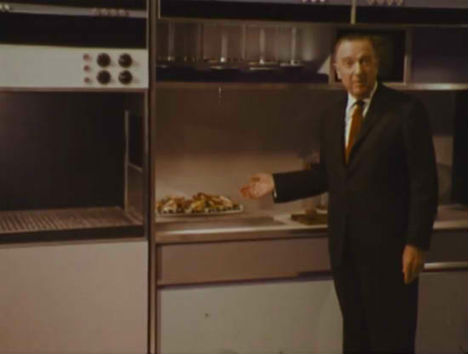Yesterday’s visions of today were surprisingly accurate in some cases, but in others, they were humorously off-base. We’re not zooming around our moon colony homes in jet packs, confirming our choice in mates with scientific body odor tests, or enjoying our favorite TV shows via implants in our brains. These 12 predicted gadgets and inventions never came to be, and while we’ll never need robotic cargo horses for our milkmen, we’re still eagerly waiting for those hoverboards. See lots more fabulous retro-futurism at the Smithsonian Magazine blog, Paleofuture.
The iPad of 1935
In the April 1935 issue of the magazine Everyday Science and Mechanics, the ‘next logical step in the world of publishing’ was envisioned: a mechanical microfilm reader mounted on a large pole that would theoretically allow you to sit back in your armchair and scroll through the pages of a book with the push of a button. Of course, unlike the modern iPad, which offers the same function, it’s not exactly portable – much less so than the book sitting on the table right next to the illustrated man.
Newspaper Printed by Your Home Radio
As envisioned in the 1930s and 1960s using radio and satellite technology, respectively, the future of newspapers would involve home printing machines that spit out the day’s news automatically each morning and evening. Philco-Ford’s Newspaper Printer, featured in an episode of the CBS show ‘The 21st Century’ entitled ‘At Home, 2001’, “provides a summary of news relayed by satellite from all over the world,” says narrator Walter Cronkite. “Now to get a newspaper copy for permanent reference I just turn this button, and out it comes. When I’ve finished catching up on the news I might check the latest weather. This same screen can give me the latest reports on the stocks I might own.”
Scientific Mate Tests
How can you determine whether you will have a successful marriage? According to an April 1924 issue of Science and Invention magazine about scientific love matching, you simply hook yourself up to a mating machine that measures your physical attraction and sympathy for your chosen partner. Recording the pulses of couples and checking their breathing while they embrace, and making sure they feel ‘sympathetic enough’ while watching their partner undergo an unpleasant procedure like having their blood drawn may not sound all that outrageous, but two other tests were even stranger. In the Body Odor Test, one partner is placed inside a capsule while the other is asked to take a sniff; if they don’t find the smells too objectionable, they’re probably a good match. The Nervous Disorder test aims to find out whether couples are too nervous around each other by testing their reaction to a surprise gunshot in the air.
Automated Farms
Throughout the 20th century, visions of the future often assumed that our 21st century lives would be full of leisure thanks to machines and automated processes. By the year 2000, they figured we’d only have to work for part of the week, and robots would do all the hardest labor. Radio-controlled farm robots, as envisioned in the syndicated comic strip Closer Than We Think!, would virtually eliminate the need for manual labor in fields. And in the March 1931 issue of Country Gentleman, the ‘farmer of the year 2031’ tends his farm virtually from a large flat-panel television.
Jet Packs for Soldiers and Personal Transport
Jet packs (as seen here on James Bond) were a frequent component of futuristic technology, first emerging in the sci-fi of the 1920s and soaring in popularity by the 1960s when they were actually invented (sort of.) While jet packs do exist, they’re definitely nowhere near practical usage as personal transport or military reconnaissance. Aside from a few public demonstrations, they’re most commonly used by astronauts in outer space, where the challenges of Earth’s atmosphere and gravity don’t exist.
Headphone Television
Television represented one of the biggest technological advances of the 20th century that was actually accessible to many average people, making its evolution a major source of speculation, from the first rumors of its existence to the days when it finally became a fixture in most homes. People began to envision long-distance visual communication as soon as the telephone was invented, and some predictions – like video chat, tiny TV sets, flat-panels and interactive programs – were right on the mark. Others, like TVs that emit smells – not so much. One concept from the comic strip Closer Than We Think! imagines television receivers that are implanted right into the brain, creating images directly in the mind, “like dreams.”
Automated Cooking with Plates Made on Demand
Another advancement detailed in the ‘At Home, 2001′ episode of The 21st Century with Walter Cronkite was fully automatic meal preparation in which meals made from ‘frozen or irradiated foods’ are programmed into a menu and prepared by a robotic chef. An entire meal could be chosen and prepared within seconds. But the weirdest part of this speculation has to do with the tableware rather than the food. Instead of getting plates from the cupboard, the robot would instantly mold plastic into plates, cups and bowls for one-time use, and then melt them back down when you’re done. The point? Not having to wash dishes. Although 3D printed plates are nearly possible today, this whole process seems fairly ridiculous and energy-intensive when dishes could simply be loaded into a magical dishwashing machine.
